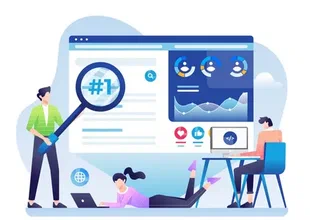Want to
Boost
Your Bussiness??
Start your digital
journey with us—reach out now.
Start your digital
journey with us—reach out now.
Digital marketing helps the IT sector and IT companies reach the right customers while building a strong online presence. With data-driven strategies, Smart5Solutions boosts visibility, generates quality leads, and supports business growth in Bhubaneswar.


We provide simple, effective, and result-focused digital marketing services that help IT companies in the IT sector in Bhubaneswar improve their online visibility, reach the right audience, and generate quality leads. Our goal is to support IT companies in the IT sector in building a strong digital presence and achieving steady, long-term growth through practical and well-planned marketing strategies.
Attract Top Tech Talent.
Boost Online Authority.
Optimize Lead Generation.
Strong Digital Infrastructure.
Innovation. Growth. Simple.

On-Page SEO: Optimizing website content, keywords, meta tags, and images for better visibility.
Off-Page SEO: Building backlinks and managing online reputation to enhance domain authority.
Technical SEO: Ensuring your website is crawlable, mobile-friendly, and fast for optimal user experience and search ranking.

Google Ads Campaigns: Running targeted campaigns that drive qualified leads to your website
Social Media Ads: Managing paid ads across platforms like LinkedIn, Facebook, and Twitter to target IT decision-makers.
Remarketing: Reaching out to previous visitors who didn't convert, bringing them back to your site.

Blog Posts and Articles: Writing informative and engaging content to attract and retain IT customers.
Whitepapers and Case Studies: Creating detailed documents that establish authority and trust in the IT sector.
Infographics and Visual Content: Presenting complex data in an easily digestible format.

LinkedIn Strategy: Leveraging LinkedIn for B2B engagement, thought leadership, and lead generation.
Twitter & Facebook Marketing: Managing accounts to share updates, engage with followers, and build brand loyalty.
Social Media Engagement: Interacting with followers to foster relationships and build brand reputation.

Lead Nurturing Campaigns: Designing automated email workflows that nurture leads through the sales funnel.
Newsletter Campaigns: Keeping your audience updated with company news, blog posts, and industry trends.
Drip Campaigns: Setting up targeted, sequential emails to guide prospects to conversion.

Brand Messaging: Developing a clear, compelling brand message that resonates with IT audiences.
Competitive Analysis: Researching competitors to identify opportunities and optimize your digital strategy.
Positioning & Storytelling: Crafting a unique narrative that sets your IT company apart in the market.
Software Solutions Delivered
Happy Clients Worldwide
Projects Completed
Customer Satisfaction
If the marketing campaign covers all aspects (SEO, content creation, paid ads, social media management, etc.) or if it's focused on a specific area (e.g., SEO or paid search), it can affect pricing.A personalized strategy will typically cost more than a generic approach.
If the marketing campaign covers all aspects (SEO, content creation, paid ads, social media management, etc.) or if it's focused on a specific area (e.g., SEO or paid search), it can affect pricing.A personalized strategy will typically cost more than a generic approach.
Digital marketing enables precise targeting through tools like Google Ads, LinkedIn, and social media, allowing IT companies to reach specific demographics based on location, behavior, and interests, making marketing efforts more efficient.
If the IT company is targeting a niche market, it may require specialized strategies, which could be more expensive due to research and tailored content. Broad market targeting might result in higher competition and ad costs but may benefit from a larger audience.
High-quality, engaging content (blogs, videos, infographics, etc.) is essential in digital marketing. Creating original and tailored content can be costly, especially if a professional writer, graphic designer, or video production team is involved.
The IT sector is highly competitive, and marketing campaigns often require more investment to stand out, especially if the company is competing for keywords or audience attention. Highly competitive industries tend to drive up the cost of PPC campaigns, SEO, and content marketing.

Digital marketing for the IT sector refers to the use of online channels, tools, and platforms to promote IT products, services, and solutions. This includes strategies like SEO, content marketing, social media, paid advertising, email marketing, and more to drive brand awareness, lead generation, and customer engagement.
Digital marketing helps IT companies by increasing their online presence, attracting more qualified leads, improving customer engagement, and boosting brand credibility. It also enables IT businesses to reach a global audience, measure their marketing efforts in real time, and tailor their strategies based on data-driven insights.
SEO (Search Engine Optimization) is the practice of optimizing a website to rank higher in search engine results pages (SERPs). For IT companies, SEO is essential to ensure their website appears when potential clients search for related services or solutions. A strong SEO strategy increases visibility, drives organic traffic, and builds trust.
Content marketing provides IT companies an opportunity to showcase their expertise, explain complex technical concepts, and educate their audience. By producing high-quality, informative content such as blogs, whitepapers, and case studies, IT businesses can build credibility, generate leads, and improve SEO rankings.
Social media plays a vital role in establishing an IT company’s online presence, engaging with potential clients, and showcasing thought leadership. Platforms like LinkedIn are particularly important for IT businesses as they allow companies to interact with decision-makers, promote services, and share valuable content.
Paid advertising (PPC) allows IT companies to target specific audiences based on keywords, location, and demographics. It offers immediate results by driving targeted traffic to a website or landing page. Google Ads, LinkedIn Ads, and display ads can help IT companies gain visibility, generate leads, and enhance brand recognition quickly.
Email marketing can be used by IT companies to nurture leads, promote new services, share industry insights, and keep clients informed about product updates. Personalized email campaigns that offer value, such as whitepapers, case studies, or exclusive content, can help build stronger relationships with potential and existing customers.p>
Targeting the right audience involves understanding your ideal customers’ needs, pain points, and behaviors. In the IT sector, your audience could be businesses of varying sizes or IT professionals looking for specific solutions. Tools like Google Analytics, LinkedIn ads, and customer personas can help identify and reach your target audience more effectively.